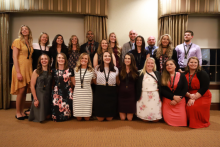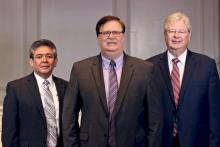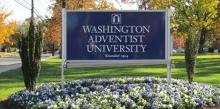News
Story by Katie Solovey
Adventist HealthCare’s two main hospitals have each received two awards from the American Heart Association and American Stroke Association for life-saving, high-quality stroke care. These awards come during National Stroke Month, which raises awareness about the signs and symptoms of stroke.
Story by V. Michelle Bernard
Kettering College (Ohio) recently celebrated its 50th commencement and conferred degrees and certificates to 227 students. Twenty of the graduates (pictured) were from the school’s first graduating Occupational Therapy Doctorate Program, which began in the fall of 2015 and is the school’s first doctoral program.
The Potomac Conference will hold two “Impact: Camp Meeting Re-imagined” events next month. This new camp meeting format, where regional meetings are held each year and a conference-wide meeting is held once every five years, kicked off in 2017. The Virginia Valley Region event will be held at the Shenandoah Valley Academy Campus in New Market, Va., June 8-9, and the Hispanic event will be in Washington, D.C., June 15-16.
Nicholas Miller, professor of church history and director of the International Religious Liberty Institute at Andrews University (Mich.), and Lincoln Steed, editor for Liberty magazine, will be the main speakers for the Virginia Valley Region.
 Story by V. Michelle Bernard
Story by V. Michelle Bernard
The REACH Columbia Union Urban Evangelism School recently graduated its first class at the school’s new center on the campus of Washington Adventist University in Takoma Park, Md.
Tiffany Brown, director, says the program gave the graduates the tools to help them be effective in soul winning and personal evangelism in whatever professions they choose.
“The preacher can only reach the people that are in church, but if you’re a dentist, psychologist or another profession, you can reach people who God brings to you in your sphere of influence,” adds Brown. “Coming to this program will teach you to be effective in soul winning,” especially in an urban setting.
"Lift Him Up" will take place at Blue Mountain Academy in Hamburg, Pa., June 8 - 16. Register online and get the link to the livestream at paconference.org.
Planned events will focus on lifting up Jesus through inspiring worship, practical seminars and relevant messages that will challenge us to intentionally connect with and connect others to Christ. The week will also feature activities, worships and service projects for children and teens, along with young adult worships and compassion ministries. Lodging and meals are available at this free event.
Camp Meeting Worship Speakers
Sabbath Worship
Attend Mountain View Conference's Camp Meeting June 15 - 13 at Valley Vista Adventist Center in Huttonsville, W.Va. For more information and a link to the livestream at mtviewconf.org.
First Weekend Speaker
Go. Tell. Serve. Three words, simple and straightforward. Yet when they are lived out in the name of the Lord, the impact is both profound and eternal.
Jesus modeled these three words for us throughout His life, and, as His followers, He directs us to go in His name and do likewise—to go and tell of His love and grace, to serve others as though we are doing so for Him. This is the purpose in His call to follow Him.
Essential to our effectiveness is that we ourselves know Jesus and accept His love and grace. When we have a personal experience with Him, we have a message to share and a pure motive to serve others.










